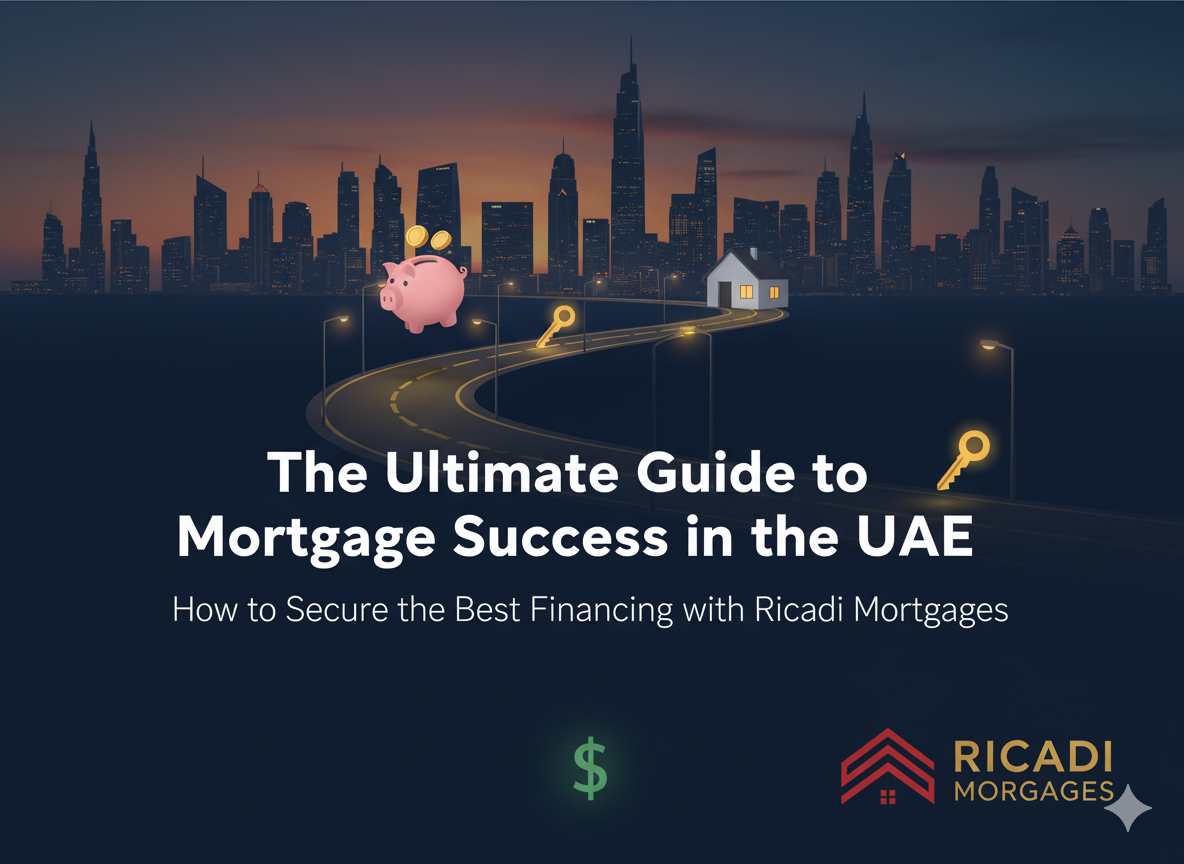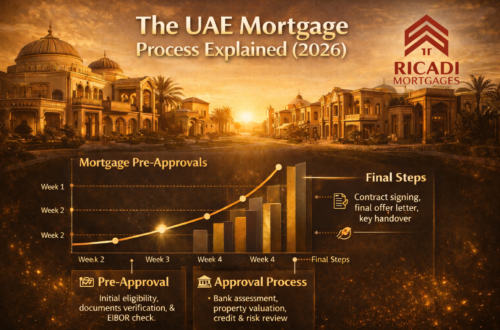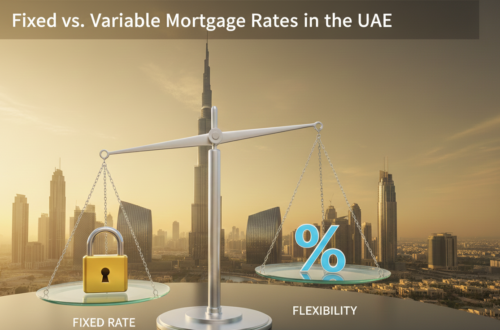Buying a home is one of the biggest financial decisions you’ll ever make — especially in a dynamic real estate market like the UAE. Whether you’re a first-time buyer, expat, investor, or want to release equity in your current property, getting the right mortgage is essential. But the difference between a good mortgage and the best mortgage can mean tens or hundreds of thousands of AED over the life of the loan.
In this comprehensive guide, you’ll discover:
- Exactly who qualifies for the best mortgages in the UAE
- What banks look for (and what you must prepare)
- Hidden costs to watch out for
- Powerful strategies to get better interest rates and terms
- Why working with a specialist like Ricadi Mortgages is often your fastest, safest, and most cost-effective route
If you are genuinely ready to buy, finance, or optimize an existing mortgage — read on. This is for you.
Table of Contents
- What Does “Qualified Mortgage Lead” Mean — And Are You One?
- How Mortgages Work in the UAE: Key Rules & Reality
- Criteria for Banks & Lenders: What They Evaluate
- Common Mortgage Types & Which One Fits You Best
- Complete Checklist: Documents, Process & Timeline
- Tips to Improve Your Mortgage Application & Terms
- Hidden Costs & Pitfalls to Avoid
- How Ricadi Mortgages Makes It Easier — What You Get Working With Us
- Success Stories: Real Cases, Real Savings
- Next Steps: How to Get Pre-Approved Today
1. What Does “Qualified Mortgage Lead” Mean — And Are You One?
A qualified mortgage lead is someone who:
- Has serious intent to buy or refinance in the near term (3-6 months)
- Has sufficient income, credit standing, or collateral to meet bank eligibility criteria
- Is ready to provide the necessary documents (salary slips, bank statements, property details, etc.)
- Can afford the down payment + monthly repayments without undue financial strain
You are likely a qualified lead if:
- You are a UAE resident (or non-resident with interest in investing)
- You have stable employment or business income
- You maintain good credit history (no large defaults, manageable debts)
- You have saved or arranged for the required down payment (usually 15-25% depending on bank and property)
- You’ve been researching interest rates, loan terms, and lenders
If that’s you, then this guide is built for your needs.
2. How Mortgages Work in the UAE: Key Rules & Reality
Understanding the landscape helps you avoid surprises. Here are key legal / regulatory / market-realities:
- Who can apply: UAE citizens, expats, and in some cases non-residents. Non-residents often have stricter requirements & higher down payments.
- Loan to Value (LTV) / Down Payment:
- For UAE nationals: Typically up to 85% financing.
- For expats: Around 80%. Must provide rest as down payment.
- For UAE nationals: Typically up to 85% financing.
- Minimum Salary Requirements: Many banks require a minimum salary (or income level). Eg AED 10,000-15,000/month or higher depending on property cost, location, and applicant profile.
- Loan Duration: Ranges generally from 5 to 25 years depending on age, salary, and bank’s rules.
- Interest Rate Types: Fixed, variable (floating), sometimes Islamic / Sharia-compliant options (profit rate rather than interest).
- Additional Costs: Down payment, bank fees, valuation fees, land registration, mortgage registration, brokerage, etc. These add up and affect affordability.
3. Criteria for Banks & Lenders: What They Evaluate
If you want the best deal, you need to meet or exceed what lenders are looking for. Here’s what banks check:
| Criteria | Why It Matters | What You Should Aim For |
| Creditworthiness / Credit history | Banks want assurance you’ll pay back. Defaults or late payments raise your rate, or make you ineligible. | No/low existing debt. Clean credit history. If you have debts, reducing them first helps. |
| Income stability | Consistent income (job or business) assures banks you’ll be able to service the loan. | If you’re salaried, longer employment; if business owner/self-employed, strong and steady revenue, ideally audited. |
| Debt-to-Income Ratio (DTI) | Banks compute your monthly debt payments vs income; high DTI is risky. | Keep DTI in a safe range; reduce existing obligations if possible. |
| Down payment / LTV | More down payment = less risk for bank = better terms. | Save at least 20-25% so you have flexibility / negotiate better options. |
| Documentation | Missing or sloppy documents cause delay / rejection. | Prepare passport, visa, salary certificates, bank statements (3-6 months), property documents, etc. |
| Age / Employment / Residency | Age affects loan term; residency status (expat / non-resident) influences bank policies. | Be clear on visa status; consider age when selecting term length. |
4. Common Mortgage Types & Which One Fits You Best
Choosing the right mortgage type can save you money and stress.
- Fixed Rate Mortgages: Interest rate locked for some years. Ideal if you expect rates to go up or simply want predictability.
- Variable / Floating Rate: Rate can change depending on central bank / market rates. Can be lower initially but riskier.
- Islamic Mortgages / Sharia-Compliant Financing: No interest – instead structured as profit/rental arrangements. Best for those who want financing aligned with Islamic principles.
- Equity Release / Refinance / Buy-out: If you own property already and want to extract equity (e.g. to invest), or want to move from one mortgage to another bank for better rate. Ricadi handles these too.
Which fits you best?
- First-time homebuyers → Fixed or hybrid fixed-variable to lock in early years.
- Investors (buy-to-rent) → Maybe variable; you want flexibility and possibly shorter term since you may sell.
- Non-residents → Need to check bank restrictions; down payment or interest rate may be higher.
5. Complete Checklist: Documents, Process & Timeline
Here’s the exact process you’ll go through and what you must have ready. Being prepared accelerates approval and avoids rejections.
Documents you must prepare:
- Passport + Emirates ID (if resident)
- Valid Visa (for expats / non-residents when required)
- Latest salary certificate or business financials (for self-employed)
- Bank statements (3-6 months)
- Proof of other obligations / debt (to compute DTI)
- Details of the property: site plan or project details, developer’s MOU or title documents, valuation evidence if available
- Down payment proof
- Previous mortgage statements (if refinancing or equity release)
Process and Timeline
- Initial Consultation & Pre-Assessment (1-2 days)
Understand your profile; check eligibility; understand bank--bank options. - Mortgage Pre-Approval (2-5 days)
Submit documents; banks check credit, verify income; issue pre-approval letter. - Property & Valuation (1-2 weeks)
Bank sends valuers / inspectors; property paperwork verified. - Mortgage Application & Offer Letter (1-2 weeks)
Bank finalises terms; sends offer letter (with rate, schedule, amortization, etc.) - Signing & Disbursement (1 week)
You accept the offer; sign; bank transfers funds; registration / transfer of ownership. - Post-registration
Ensure all legal registration is done; check title deed, mortgage entries, etc.
6. Tips to Improve Your Mortgage Application & Terms
These tips can make a big difference in interest rate, equity, monthly payments:
- Pay off or reduce existing debts first: improves debt-to-income ratio.
- Choose shorter loan term if possible: interest cost overall is less (though monthly payments higher).
- Consider bigger down payment: reduces loan amount, reduces interest, gets you better LTV.
- Improve your credit score / history: avoid defaults; settle bills; keep credit utilization low.
- Negotiate with multiple lenders: comparing offers gives leverage.
- Lock rates if you expect interest to increase: though sometimes variable may drop, fixed brings certainty.
- Use a mortgage consultant: experts know bank policies, hidden fees, negotiation tactics — can save you time and money.
7. Hidden Costs & Pitfalls to Avoid
Even well-prepared buyers can be caught off guard. Be aware:
- Property valuation fees
- Bank processing & documentation fees
- Mortgage registration and land department fees
- Brokerage / agent fees (sometimes sellers include, sometimes buyers)
- Early repayment / settlement fees if you plan to pay off early or refinance
- Penalties for missing payments or late payments
- For non-residents: sometimes higher interest rates, larger down payments, extra paperwork
Transparent disclosure of all costs is crucial. Empower yourself asking all parties (bank, developer, agent) for full cost breakdowns in writing.
8. How Ricadi Mortgages Makes It Easier — What You Get Working With Us
You could try going bank-to-bank on your own. But here’s how Ricadi Mortgages adds value, reduces risk, and speeds up the process — which often leads to better deals and higher conversion.
- Free & Independent Advice: We are not tied to any single bank. Our job is to find the best mortgage deal for YOUR situation.
- Full range of mortgage solutions: First-time buyer, resident, non-resident, equity release. Whatever your case, we have worked through similar deals.
- Expert guidance through documentation: Many applications stall because of paperwork issues. We help you prepare clean, accurate, bank-compliant documents.
- Negotiation leverage: Because of our relationships with multiple banks and understanding of risk, we can often get you rates/terms you might not get on your own.
- Faster processing & issue resolution: When there are roadblocks (valuation delays, bank queries, unexpected cost demands), we know how to push through.
- Transparency & no hidden costs: We believe clients trust us when all fees, charges, and scenarios are clear up front.
9. Success Stories: Real Cases, Real Savings
Let’s look at examples of people who came to us, and how much they benefited.
Case A: First-Time Expat Homebuyer
- Profile: Non-resident, expatriate working in finance; salary AED 20,000/month; looking at a AED 2 million apartment.
- Challenges: High down payment, sparse credit history in UAE, concerns about rate volatility.
- What we did: We compared fixed vs floating, negotiated a fixed rate for the first 3 years, helped him prepare documentation to meet lender’s compliance, and reduce his DTI restructuring some existing debt.
- Result: Secured 80% financing (down payment 20%), 3.75% fixed for first 3 years, total fees reduced ~AED 15,000 vs what the standard bank-offered package would have cost.
Case B: Equity Release + Refinance
- Profile: Owner of a villa; wants to extract cash to invest in a second property. Mortgage outstanding; current interest rate high.
- Challenges: Bank passive on refinance terms; need for valuation, legal burdens.
- What we did: Did market scan; found bank offering better rate; handled refinancing + release of equity; managed legal, valuation, and documentation so owner didn’t have to chase every step.
- Result: Lower monthly payments, freed up capital for investment, better interest cost over loan term; simplified paperwork.
10. Next Steps: How to Get Pre-Approved Today
If you’re convinced and want to take action now, here’s your roadmap to move from thinking to approved:
- Reach out for a free consultation — Ricadi offers no-obligation assessments.
- Fill out a simple eligibility / profile form — income, employment, property type, down payment.
- Gather required documents — see checklist above. The more complete, the faster.
- Get pre-approval — with us helping you submit to the bank(s) best suited to your profile.
- Evaluate offers — we will present you multiple options (interest, upfront costs, flexibility).
- Proceed with the one that best suits you — sign, complete registration & fund disbursement.
Conclusion
If you are serious about buying or optimizing mortgage financing in the UAE, doing it right matters. A few percent difference in rate, a cleaner application, better terms, or fewer hidden fees can save you tens or hundreds of thousands of AED over the life of the loan.
Ricadi Mortgages is here to guide you — with expertise, transparency, and commitment to your best outcome, not the bank’s. If you match the “qualified lead” profile, don’t wait. Reach out, get pre-approved, compare your options, and make the home purchase (or refinancing / equity release) you deserve — with confidence.
Contact Ricadi Mortgages today for your free mortgage eligibility assessment.
Drop us your details, and we’ll send you 2-3 bank offers & a full cost breakdown — no commitment required.
FAQs About UAE Mortgage Approval Criteria
1. What criteria do banks in the UAE check before approving a mortgage?
Banks in the UAE look at several key factors before approving a mortgage application. These include your credit history, income stability, debt-to-income ratio (DTI), down payment or loan-to-value ratio (LTV), the completeness of your documentation, and your residency or employment status. Meeting these criteria increases your chances of securing the best financing terms.
2. Why is credit history important for getting a mortgage in the UAE?
Credit history gives banks a clear picture of how reliably you manage debt. A clean record with no defaults or late payments reassures lenders that you will repay the loan on time. On the other hand, poor credit history can result in higher interest rates or even mortgage rejection.
3. What is the minimum down payment required for mortgages in the UAE?
Most UAE banks require at least 20–25% down payment for residents and a higher percentage for non-residents. The more you contribute upfront, the lower the bank’s risk, which can help you negotiate better interest rates and flexible terms.
4. How does income stability affect mortgage approval in the UAE?
Stable income is a major requirement. Salaried employees with long-term contracts are viewed more favorably, while self-employed or business owners need to show consistent revenue and preferably audited accounts. Banks want assurance that you can meet regular repayment obligations.
5. What documents are required to apply for a UAE mortgage?
Typical documents include:
- Passport and valid UAE visa
- Emirates ID (for residents)
- Salary certificate or proof of income
- Recent bank statements (3–6 months)
- Property documents (sale agreement, title deed, etc.)
Incomplete or missing documents can delay approval or lead to rejection.
6. How does debt-to-income ratio (DTI) impact mortgage approval?
Your debt-to-income ratio measures how much of your monthly income goes toward debt repayments. A high DTI signals greater risk to banks. Reducing your existing financial obligations before applying for a mortgage can improve your eligibility and secure better terms.
7. Do age and employment status affect mortgage eligibility?
Yes. Age can influence the maximum loan tenure available to you, as most banks set upper limits (often around age 65 for expatriates and 70 for UAE nationals at loan maturity). Employment type also matters — salaried individuals often face fewer hurdles than freelancers or business owners.
8. Can expatriates and non-residents apply for mortgages in the UAE?
Yes, expatriates and even non-residents can apply for mortgages in the UAE, though the terms may differ. Non-residents often face higher down payment requirements and stricter documentation checks compared to residents. However, specialized lenders like Ricadi Mortgages help navigate these options effectively.






